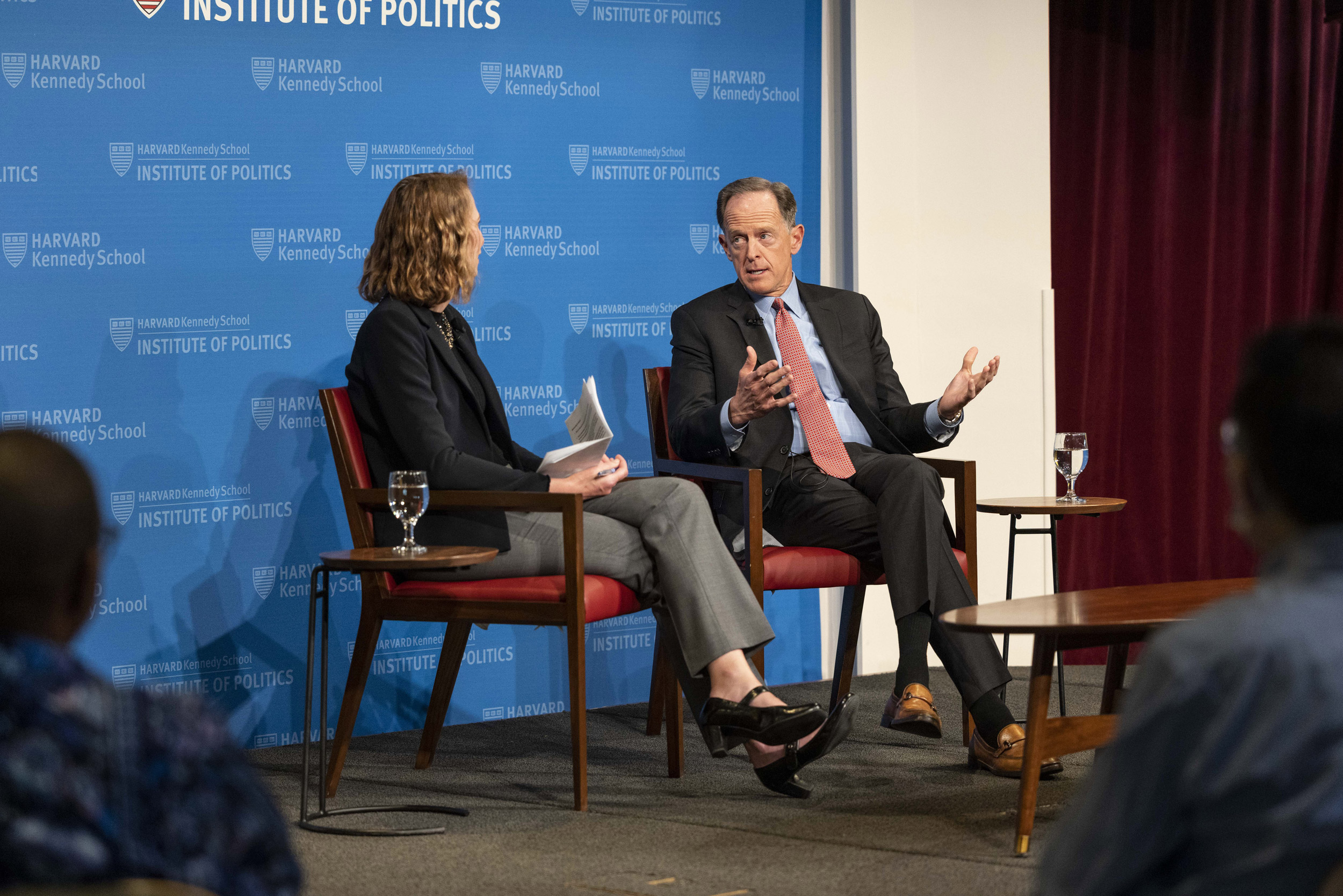
Former Republican Sen. Pat Toomey (right) offered his candid views on the state of the U.S. economy, recent missteps by the Federal Reserve, and the looming debt ceiling showdown in Washington with Karen Dynan, former chief economist at the U.S. Treasury.
Photo by Scott Eisen
Toomey doesn’t see recession looming
But former Republican senator blames Fed for nation’s current economic woes, backs big budget cuts in wide-ranging Kennedy School event
Former Republican Sen. Pat Toomey says the U.S. economy appears “quite healthy” — given the low unemployment rate and consumer resilience — and he doesn’t think the nation will go into a severe recession unless the Fed “goes way too far” with interest rate hikes.
“We’ve had the most accelerated tightening, maybe ever, certainly in a very long time. And I think the danger is that they’re going to go too far because they’re making the same mistake” made at the start of the pandemic when interest rates stayed too low, but now “in reverse,” he said during a talk Thursday evening at the JFK Jr. Forum. “Instead of focusing on money supply and the monetary aggregates, they’re focusing on trailing indicators, and I worry that they could overdo it.”
Speaking with Karen Dynan, chief economist at the U.S. Treasury from 2014 to 2017 and now a professor of the practice in the Economics Department and at Harvard Kennedy School, Toomey ’84 offered his candid views on the state of the U.S. economy, recent missteps by the Federal Reserve, and the looming debt ceiling showdown in Washington during the HKS event.
Toomey, who represented Pennsylvania, established a reputation as a fiscal conservative during his 12 years in the U.S. Senate and six years as a member of the House of Representatives. The Providence, R.I., native was the ranking member of the Senate Banking Committee and served on the budget and finance committees before retiring in January.
He said that Congress did the right thing in moving quickly to provide trillions in emergency relief at the onset of the pandemic to prevent the U.S. economy from cratering and to help the Fed provide liquidity so that capital markets could continue to function. But the central bankers kept interest rates low even as it became clear into late 2020 that the crisis had passed, said Toomey.
“Many of us were concerned that the combination of negative real interest rates, massive bond buying, huge expansion in the money supply, and all of this fiscal spending that’s being monetized by the Fed — how does that not lead to inflation?” he said. “And sure enough, it exploded shortly thereafter.”
The Federal Reserve needs to “take a deep dive in[to] how they got this wrong,” said Toomey, who introduced a bill in late 2022 to overhaul the Fed by cutting the number of regional banks from 12 to five, stopping “left-leaning political activism” around climate or social issues, and by requiring regional bank heads and the Fed general counsel to be subject to presidential appointment and Senate confirmation. There’s been a “huge cost, and I think they’ve got some explaining to do.”
Congress should be involved, but Congress ought to also “re-examine” whether it should have a regular role in U.S. monetary policy, he added.
Once considered a GOP hard-liner, Toomey was one of seven Senate Republicans who voted to convict former President Donald Trump of inciting the Jan. 6 insurrection during the second impeachment trial in Feb. 2021. The move drew criticism from Trump loyalists. His retirement, which he announced in 2020, left a highly contested vacancy that was filled by Democrat John Fetterman.
A longtime proponent of reforms to Social Security, Toomey said it’s been an “abrogation of responsibility” by both President Biden and Trump to have ducked the reality that the program, and Medicare, will not remain viable for those now in their 30s without slowing the rate of growth in expenditures. But both parties have to set aside politics and come together.
“It’s hard politically because the mere suggestion creates a political opportunity for your opponent to say, ‘Oh, you want to push granny off the cliff.’ That’s really irresponsible and dishonest.”
Where Toomey supports a fight is over the debt ceiling. He is a supporter of the current House Republican plan that calls for $4.5 trillion in budget cuts, which Biden has rejected, and rejects Democratic doomsaying about the need to raise the nation’s borrowing limit. There’s “close to a zero percent possibility” the U.S. will miss a payment and default on its debt, thereby creating an economic disaster for the financial markets because the U.S. is collecting eight times the amount in taxes that we owe in debt service, he said.
It is possible that some vendors won’t get paid on time if there’s no agreement by June, the point at which Treasury Secretary Janet Yellen has said the U.S. would run out of funds to make debt payments.
“That is not ideal. I’m not an advocate for it. But it’s not the same thing as missing your interest on your debt,” he said, adding that he suspects after brinksmanship, Congress and Biden will probably get it resolved.
Asked how concerned he is about income inequality in the country, Toomey said it’s something he is somewhat concerned about. The gap has been exacerbated by the Federal Reserve’s policy of easy money, which set off inflation and dramatically drove up the value of assets that the rich typically hold, like real estate, stocks, and art. There would have been less of a spike with more stable prices and a more sensible monetary policy, he said.
“So, I think it’s something we should keep an eye on. But the most important thing is to have strong growth and a lot of opportunity.”





